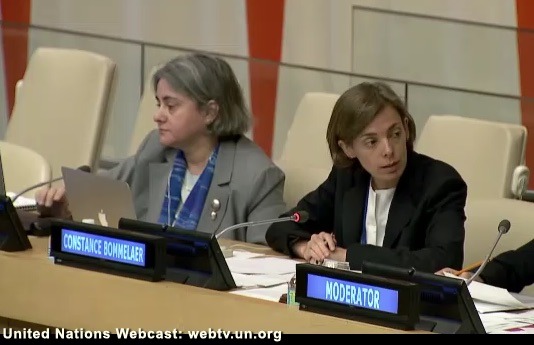Note: Today, 2 July 2015, Constance Bommelaer delivered the following remarks to the United Nations “Informal Interactive Stakeholder Consultation”, convened by the President of the UN General Assembly, as part of the planning for the 10-year review of the World Summit on the Information Society (WSIS). For more information about the WSIS+10 process, please see Constance’s earlier blog post as well as our WSIS page. A video recording of her remarks is included at the end of this post.
Mr. President, excellencies, distinguished guests, ladies and gentlemen,
It is my honor to be here with you today, to share the perspective of the Internet Society on progress made in the implementation of the WSIS outcomes.
The organization that I represent, the Internet Society, finds its origins in the technical community that first began collaborating over 40 years ago and which brought the Internet. As a global organization of 71,000 members and 108 chapters in 92 countries, our organization has been engaged in all stages of the WSIS.
We’ve come a long way since the Tunis Agenda recognized the respective roles and responsibilities of governments, civil society, business and the technical community in shaping the evolution of the Internet. In just the past 10 years, we have made impressive progress in implementing the goals laid out in Geneva, and then Tunis.
First of all, a more cohesive Internet community has emerged. I remember 15 years ago when working for the French government, sitting on the other side of the fence – we had little knowledge of the community of pioneers that brought the Internet. Today bridges have been built between all groups, learning from each other.
Concretely, the number of policymakers participating to technical meetings where Internet standards are developed – such as the IETF – is increasing. But also, inter-governmental organizations are progressively opening the door to stakeholders.
Concretely, the elaboration and endorsement of the ITU and UNESCO WSIS review outcomes, by all stakeholders, in 2013 and 2014, have become milestones in the collective memory of the Internet community.
Concretely, public-private partnerships for infrastructure development and capacity building have helped bring more than 3 billion people online.
But access is not the ultimate goal, it is only a means to an end: sustainable development and human empowerment.
And here are the ultimate challenges: We need the Internet to be an enabler for Human Rights. We need more leading women in the technology field, for the Internet to contribute to gender equality. We need innovation to transcend frontiers, for the next Facebook to come from a developing country. We need a secure Internet that users can trust.
Getting there will require collaborative governance and mutual respect. No one does it alone, as stated in the Tunis Agenda, and I quote: “The management of the Internet (…) should involve all stakeholders and relevant intergovernmental and international organizations”
There are many examples of the benefits of collaborative governance. I’ll share just one: the Internet Governance Forum (IGF), this unique platform that allows all stakeholders to come together to share insights. This year, participants are tackling important challenges such as developing Policy Options for Connecting the Next Billion, or Best Practices to counter abuse against women online. The multiplication of IGF-type initiatives, on all continents, demonstrates the viability of the model. This is why, we strongly call for the renewal of its mandate beyond 2015 and welcome Mexico’s generous offer to host IGF 2016.
Today, the principle of collaborative governance appears to be more relevant than ever. The world’s increasing reliance on ICTs commands to broaden the partnership to enroll ICT sector foundations, development agencies, SMEs from emerging regions and many others who have a critical stake in the Internet’s development.
Of course, collaborative governance, with all stakeholders at the table, is not always easy; it takes timeand hard discussions. But the results are also often more robust, efficient and legitimate as a consequence.
In the same spirit, we believe that preparations for the WSIS+10 High-Level event in December, should be as inclusive as possible. In this regard, I would like to thank again the President of the UN General Assembly and the two co-facilitators, as well as all delegates, for having us here today.
Thank you.
Note: Thank you to Joly MacFie of the Internet Society New York Chapter for capturing the video segment.

